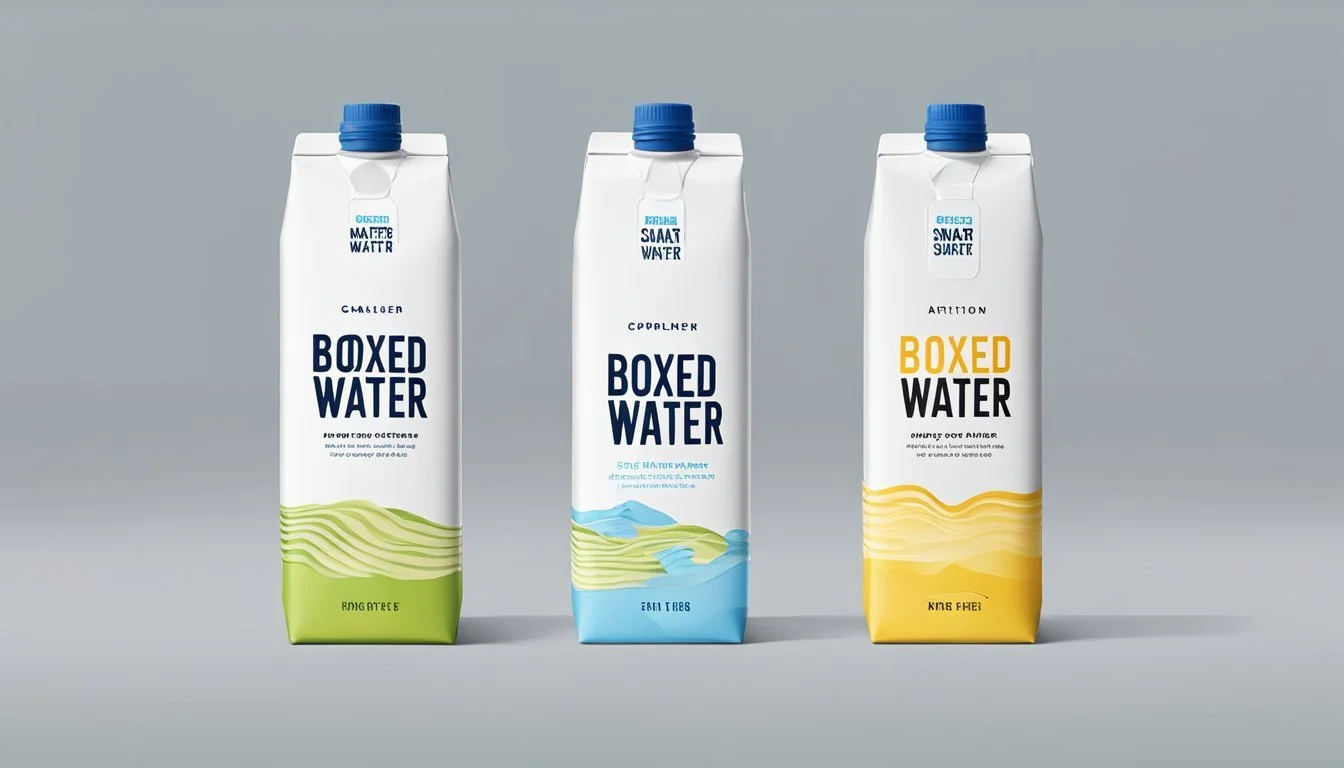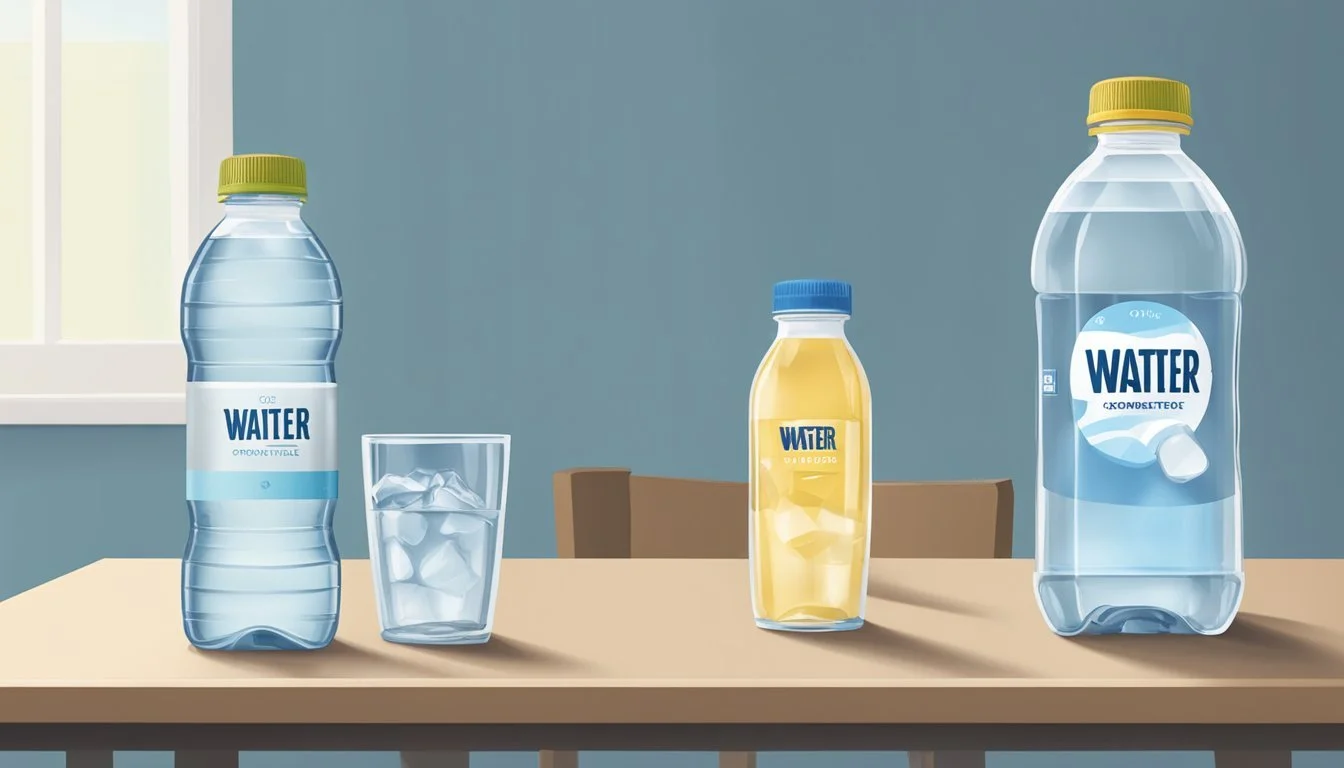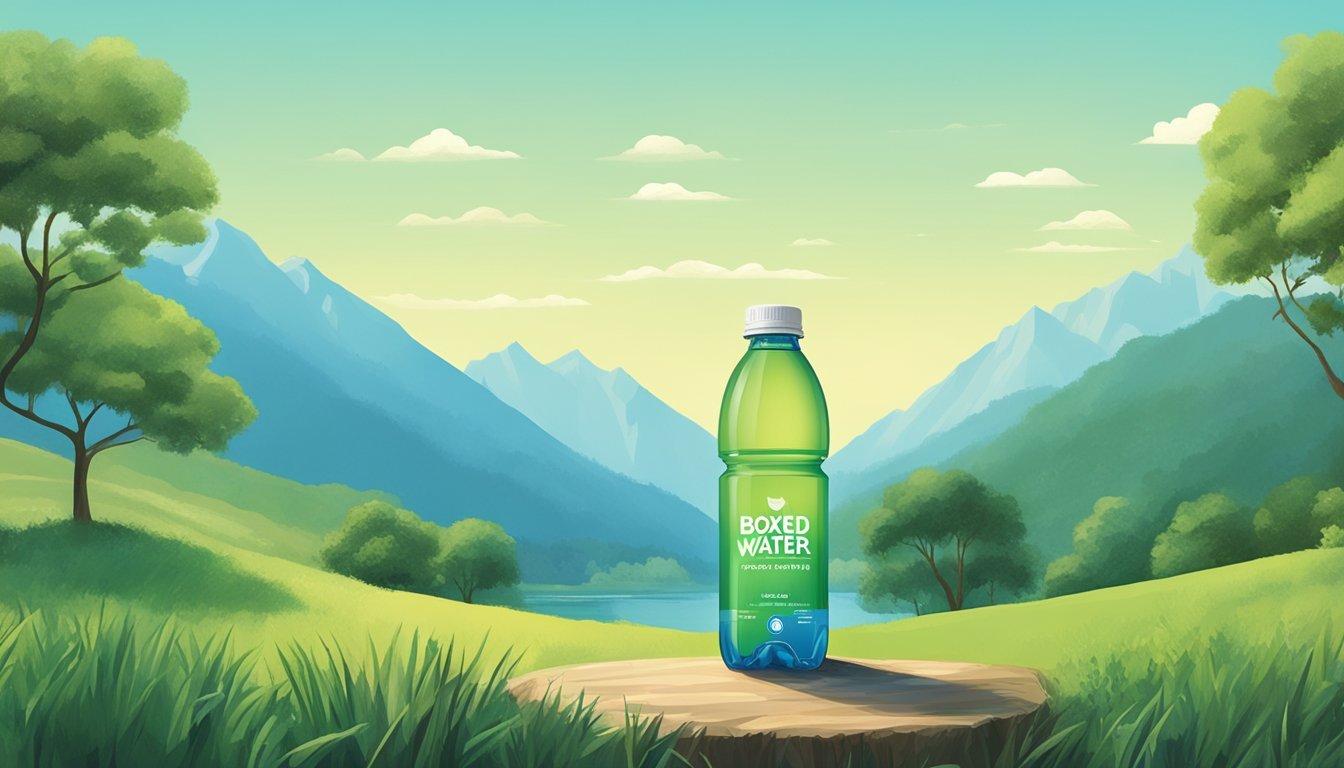Boxed Water vs. Smartwater
An Objective Comparison of Bottled Water Brands
In the world of portable hydration, consumers are faced with an array of choices, each promising a range of benefits, from convenience to environmental friendliness. Two notable contenders in this market are Boxed Water and Smartwater. Boxed Water has emerged as an innovative player, packaging its product in paper-based cartons, a design intended to provide a more sustainable alternative to plastic bottles. Smartwater, on the other hand, is distinguished by its vapor-distilled water, enhanced with electrolytes for a crisp, clean taste.
While Smartwater has earned its reputation for a unique purification process and added electrolytes, Boxed Water's appeal hinges on its commitment to reducing plastic use and its potential environmental impact. Packaging is a significant factor in the bottled water industry's footprint; hence, Boxed Water's cartons, which comprise mostly paper, a renewable resource, suggest a lower environmental impact if recycling facilities are available. Smartwater, contained in 100 percent recyclable plastic bottles, has established brand loyalty through its distinct taste and the perceived health benefits of its added electrolytes.
As the market for bottled water grows, the debate between boxed and bottled variants continues. Consumers weigh factors such as taste, convenience, cost, and environmental sustainability. Both Boxed Water and Smartwater have carved niches that respond to different sets of consumer priorities, leaving the choice between them dependent on an individual's values and preferences.
Overview of Bottled Water
In the landscape of hydration solutions, bottled water has seen a significant rise due to its convenience and improved water quality claims. Brands like Smartwater and Boxed Water highlight the evolving market trends that focus on both consumer health and environmental impact.
Rising Demand for Packaged Water
At the heart of the consumer market, there is an increasing preference for packaged drinking water. This shift is propelled by an escalating concern for consistent water quality and the ease of access that bottled water offers. Smartwater, for instance, is often chosen for its added electrolytes and distinct marketing proposition as a premium water brand. Meanwhile, Boxed Water emphasizes its environmental mission, capturing attention with its distinctive paper-based packaging.
The Role of Branding in Consumer Choices
Branding plays a pivotal role in guiding consumer decisions in the bottled water market. Consumers tend to associate certain brands with quality, taste, and even lifestyle aspirations. The brand message and mission can influence a consumer's choice significantly; for example, Boxed Water's promise of a smaller carbon footprint due to its 74% paper-based packaging can sway environmentally conscious consumers. On the other hand, brands like Smartwater appeal to those seeking a more luxurious drink that goes beyond simple hydration.
Boxed Water: An Innovative Approach
Boxed Water is a company that has challenged traditional bottled water by offering a product that prioritizes environmental sustainability and health considerations. Their innovative carton-based packaging distinguishes them in the marketplace.
Environmental Benefits of Boxed Water Packaging
Boxed Water's cartons are composed primarily of paper, a renewable resource, which offers a more sustainable alternative to traditional plastic water bottles. The packaging is reported to be 92% plant-based, and the cartons are made with 74% paper. The paper used in the cartons is sourced from sustainably managed forests, aligning with the company's commitment to the environment.
Renewable Paper Content: 74%
Other Components:
Aluminum: 1%
Plastic: 25%
The combination of materials provides the necessary durability and waterproofing, while still maintaining a high level of recyclability. Consumers are encouraged to participate in carton recycling programs to ensure the materials are appropriately reprocessed.
Health and Safety Considerations
For consumers, the safety of the water they drink is paramount. Boxed Water addresses these concerns by using packaging materials that are FDA-compliant for contact with food and beverages. This compliance ensures that no harmful substances leach into the water, providing a safe container for consumption.
Regarding water quality, while Boxed Water doesn't specifically advertise the removal of substances like arsenic or fluoride, it does emphasize its multi-step purification process, which includes reverse osmosis, carbon filtration, and UV treatment. This process is designed to ensure that water meets or exceeds industry standards for purity, aligning with customer expectations for both health and safety.
Smartwater: A Trend or a Staple?
Smartwater has positioned itself within the bottled water market as a premium brand, with claims of advanced hydration and a unique filtration process. Consumers' favor fluctuates as they consider the health and environmental impacts of their choices.
Smartwater's Unique Filtration Process
Smartwater undergoes a filtration process that distinguishes it from many other bottled waters. It is vapor-distilled, a method that involves boiling the water and then condensing the steam into a liquid to remove impurities and contaminants, such as metals and bacteria. Additionally, Coca-Cola, the producer of Smartwater, incorporates electrolytes like calcium, magnesium, and potassium for taste after the distillation process. While this process mirrors the natural hydrologic cycle, it aims to create pure, clean-tasting water.
The use of plastic in bottling, however, raises environmental concerns due to the carbon footprint associated with plastic production. Consumers increasingly consider the lifecycle of plastic bottles, from production to potential FDA regulations concerning recycling and plastic waste.
Consumer Perception and Market Impact
Consumer perception of Smartwater has evolved since its introduction. Initially, it capitalized on a trend for health-conscious hydration solutions, but over time, it has sought to become a staple in the market for those seeking a consistent and trusted bottled water option. Coca-Cola's marketing strategies have solidified Smartwater's presence in the beverage industry, positioning it as a premium product.
Smartwater's impact on the market can also be gauged by comparing it with competitors. For instance, features such as the choice of packaging - particularly plastic bottles - come under scrutiny when contrasted with alternatives like Boxed Water's paper-based cartons, reflecting consumers' growing environmental awareness.
Throughout, the tone remains confident, knowledgeable, neutral, and clear, providing specifics while avoiding exaggerations.
Comparative Analysis of Boxed Water and Smartwater
In the context of environmental sustainability and health concerns, consumers often weigh their options between Boxed Water and Smartwater. This section dissects the two brands, focusing on their packaging innovations alongside environmental impacts, and evaluates their significance in health and hydration.
Packaging Innovations and Environmental Impact
Boxed Water hails its carton-based packaging as a step forward in environmental friendliness. Their cartons are reported to consist of 74% paper, contributing to a more sustainable profile. The inclusion of 1% aluminum and 25% plastic ensures the packaging is watertight while being more eco-conscious than traditional plastic bottles.
On the other hand, Smartwater bottles are made predominantly of plastic, although it is a type that is easily recyclable. However, the environmental footprint of producing and recycling these single-use plastic bottles generally remains higher than that of more renewable resources.
Comparing the two, Boxed Water demonstrates a stronger commitment to reducing plastic use—key in the fight against plastic pollution.
Aspect Boxed Water Smartwater Materials Used 74% paper, 1% aluminum, 25% plastic Predominantly recyclable plastic Single-Use Plastic Minimal Yes, primary composition Recyclability Mostly recyclable Fully recyclable Environmental Claim More sustainable materials Recyclable, but with higher footprint
Health and Hydration Effectiveness
Both Boxed Water and Smartwater brands claim to provide pure, clean water perfect for hydration. The focus on health is evident in Smartwater's production process which involves vapor distillation, a method that purifies water, akin to the hydrologic cycle. Additionally, Smartwater infuses some of its products with electrolytes for taste.
Meanwhile, there have been concerns about the presence of microplastics in bottled waters. While Boxed Water may offer a solution with its minimal plastic use, consumers should also be aware of overall water safety beyond just plastic content. Elements such as arsenic, although not highlighted in the context of these two brands specifically, should be a consideration for consumers when evaluating the healthiness of bottled water.
Both brands comply with FDA regulations for water safety, but the use of plastics in water packaging raises additional health concerns due to potential leaching.
Aspect Boxed Water Smartwater Filtration Process Not specified Vapor distillation Microplastics Lesser due to reduced plastic use Potential risk due to plastic bottles Additional Minerals Not specified Electrolytes infused variants available Compliance with FDA Yes Yes Arsenic Levels Not specified Not specified
In summarizing, Smartwater boasts a purification process aimed at recreating the hydrologic cycle, potentially offering added benefits for those seeking enhanced taste from their hydration experience. Boxed Water's reduced plastic strategy contributes positively to environmental sustainability and could be a decisive factor for environmentally conscious consumers.
Sustainability and Corporate Responsibility
This section examines the sustainability efforts and corporate responsibility initiatives of Boxed Water and Smartwater. It focuses on their approaches to reducing carbon footprint and plastic use, along with their distinct missions and environmental commitments.
Reducing Carbon Footprint and Plastic Use
Boxed Water presents a sustainable alternative to traditional plastic bottles, using primarily paper-based, recyclable cartons. These cartons consist of 74 percent paper, 1 percent aluminum, and 25 percent plastic, which helps in maintaining waterproof properties. The company tackles environmental concerns by reducing reliance on oil, the raw material for plastic, and by lowering its carbon footprint through more efficient packaging designs and materials.
Smartwater, on the other hand, traditionally comes in plastic bottles. However, the brand has made strides in sustainability by introducing options like reusable water bottles. The goal is to reduce single-use plastic waste and encourage consumers to move towards more sustainable consumption practices.
Companies' Missions and Environmental Commitments
Boxed Water works under a mission emphasizing environmental conscientiousness. Apart from sustainable packaging, it partners with reforestation foundations to commit to planting trees, thereby contributing to a greener environment.
Smartwater, produced by The Coca-Cola Company, has widespread environmental commitments. They aim to create a more sustainable business model by replenishing water sources and reducing their overall carbon footprint. The company's global commitment extends to enhancing water efficiency and supporting water sustainability.
Both companies recognize the importance of sustainability in their operations, striving to implement environmentally friendly practices as part of their contribution to corporate responsibility.
Consumer Choices and Alternatives
In the face of environmental impact concerns, consumers now seek alternate packaged water options that lean towards sustainability and personal health.
The Shift to Eco-friendly Water Solutions
Consumers are increasingly prioritizing eco-friendly packaging when selecting their bottled water. Companies like Boxed Water Is Better have responded by offering products with 92% plant-based packaging. This push towards sustainable alternatives is driven by the need to reduce plastic waste, as traditional bottled waters contribute significantly to environmental pollution.
Eco-friendly Packaging Materials:
Paper: Major component in boxed waters, like 74% in Boxed Water Is Better cartons.
Aluminum: A small percentage used for preservation, such as 1% in some cartons.
Plant-based Plastics: Reduce fossil fuel reliance; some are BPA-free.
Adopting Reusable Water Bottles and Filtration Systems
Another significant shift has been toward reusable water bottles and in-home filtration systems. Reusable bottles, often made from materials like stainless steel and glass, offer a long-term solution that can minimize the need for single-use plastics.
Reusable Bottle Brands:
Path Water: Provides a refillable aluminum bottle alternative.
Filtration Options:
Charcoal sticks
Faucet attachments
Pitcher filters
Each of these solutions allows consumers to enjoy good quality tap water without the waste associated with single-use bottles.
The Broader Impact on Society and the Environment
Choosing between Boxed Water and Smartwater extends beyond personal preference, intersecting with public health concerns and environmental stewardship. The debate sheds light on wider societal impacts and the need for careful resource management.
The Role of Water in Public Health and Policy
Access to clean drinking water is a cornerstone of global health and public health. Bottled water, like Smartwater, provides a safe drinking option when tap water may be compromised, which can be crucial during emergencies. However, the excessive consumption of bottled water in non-emergency situations can strain public resources and affect water policies. Policymakers must balance the provision of public water sources with the impacts of bottled water on municipal waste and recycling systems. Sustainable practices in the water industry are critical to maintaining public health without depleting natural resources.
Environmental Advocacy and Water Resource Management
The environmental impact of bottled water production is significant. Products like Boxed Water promote a green alternative with paper-based packaging, which may lessen the ecological footprint if the materials are sustainably sourced and the end product is efficiently recyclable. In contrast, traditional plastic bottles, such as those used by Smartwater, contribute to higher carbon emissions and can lead to loss of biodiversity if not managed properly. Environmental advocacy groups often call for greater transparency in marketing, to avoid greenwashing, and encourage investment in R&D to develop more sustainable packaging solutions. Effective water resource management requires the cooperation of companies, consumers, and policymakers to minimize negative impacts and promote a sustainable future.
Conclusion: The Future of Bottled Water Industry
The future of the bottled water industry is shaping up to be a battleground for sustainability and innovation, influencing consumer choices and environmental impact.
Predictions and Trends
In recent years, market trends show a pivot towards sustainable packaging, with companies like Boxed Water™ introducing paper-based cartons as an eco-friendlier alternative to traditional plastic bottles. As energy efficiency and reducing carbon footprint become central to production processes, one can expect to see further advancements in sustainable practices within the industry. For instance, advancements that minimize the use of plastic and maximize the use of renewable materials are on the uptick.
Growth of Sustainable Packaging: Paper-based, biodegradable materials are predicted to increase in prevalence.
Preference Shifts: Younger demographics are consistently showing a preference for bottled water, which could drive the market's expansion and innovation.
Technology Integration: Innovations aimed at ensuring product safety while enhancing eco-friendliness, like combining paper with waterproof linings, are likely to evolve.
The Bottom Line for Consumers and the Planet
For consumers, the push towards more sustainable bottled water options means they can expect to make choices that not only benefit their health but also the health of the planet. The bottom line reflects a growing demand for products that offer convenience without compromising on environmental values.
Consumer Health: Bottled water brands often highlight the purity and mineral content of their water, catering to health-conscious individuals.
Environmental Impact: The industry's growth demonstrates a need to tackle the global water crisis by promoting responsible consumption and production.
It's clear that the industry must balance market expansion with sustainable development to maintain its trajectory. The trends in consumption habits and environmental awareness are pushing the bottled water industry towards a more responsibly managed future.







